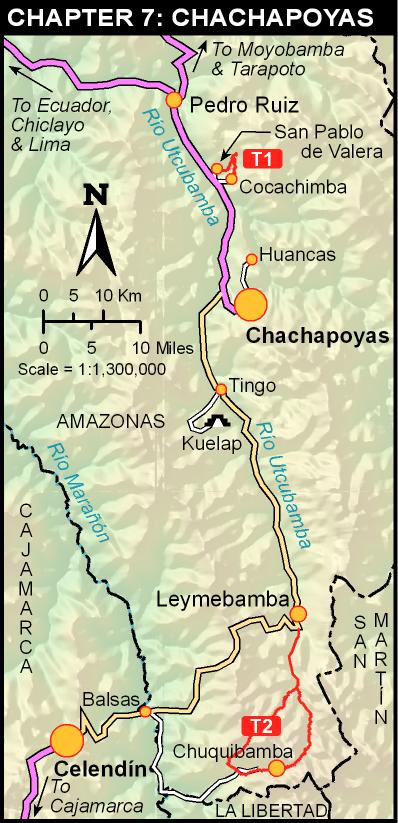|
CHAPTER 7
CHACHAPOYAS
The northern highlands of Peru are full of
natural beauty and archaeological riches,
ideal for trekking. Nestled here amid sheer
cliffs sprouting cloud forests and waterfalls
is the quaint city of Chachapoyas
or “Chacha,” as the locals call it.
Chachapoyas is capital of the department
of Amazonas and namesake of a large
surrounding area. The city makes a pleasant
base from which to explore these surroundings.
It has most services and good
road links to Chiclayo, Lima, Tarapoto,
the jungle, and neighboring Ecuador.
Light aircraft fly between Chachapoyas
and Tarapoto. The closest options for flying
from Lima, then taking a bus, are via
Jaén, Tarapoto, or Chiclayo. The impressive
valley of the Río Utcubamba, a tributary
of the Río Marañón, which in turn
flows to the Amazon, is at the heart of the
Chachapoyas region.

Chachapoyas has some of Peru’s most
fascinating and least exploited archaeological
areas. It was once home to the
pre-Inca Chachapoya people (ad 0–1500),
and a number of their ancient cities and
fortresses can be visited. Unique cliffside
niches containing many sarcophagi,
lost stone cities, and over two hundred
Inca mummies found at Laguna de los
Cóndores are just a few of the treasures
hidden by the lush vegetation. Not to
be missed is the superb Leymebamba
Archaeology Museum, 75 km south of
Chachapoyas, where many of the Inca
mummies from Laguna de los Cóndores
are displayed alongside a fine collection of
textiles and other artifacts. The museum
is along the route of Trek 2 ...
Trek 1
GOCTA
THE SECRET WATERFALL
SECRETS OF THIS SIZE are hard to keep, yet the residents of the district of Valera,
northwest of Chachapoyas, did not reveal the existence of Gocta, a 771-meter waterfall,
until the German Stefan Zimmendorff came across it in 2002. This spectacular waterfall,
surrounded by cloud forest, ranks third in the world on the National Geographic
Society’s list, after Angel Falls in Venezuela and Tugela Falls in South Africa. Gocta
has two tiers: the upper waterfall is 231 m high, and the lower waterfall is 540 m high.
Gocta is the source of the Río Cocahuayco, a tributary of the Utcubamba, and good
trails on both sides of the Cocahuayco lead to the falls. Views along the way are magnificent,
and the area is rich in flora and fauna, including 110 bird species and 41 species
of orchids ...
Trek 2
RÍO ATUEN CIRCUIT
TRANQUIL TREKKING
THIS IS THE MOST delightfully laid-back and flexible of our longer treks. You can end
halfway at Cochabamba or Chuquibamba if you wish, or add several worthwhile side trips to
the main route. (The total distance given above and the elevation profile are for the complete
trek without side trips.) There is some steady climbing along the way, as well as cross-country
sections where navigation skills are required, but the overall trek is not particularly difficult.
Elevations and nighttime temperatures are moderate by Peruvian highland standards. The
valleys are well watered and green all year, filled with hummingbirds, orchids, and other
wildflowers in season (May is delightful). With a little luck you might see condors ...
|



